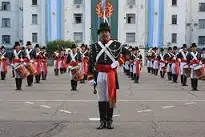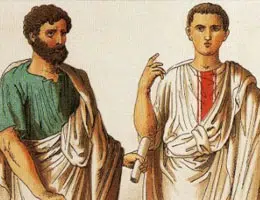 Patrick is a term that derives from the Latin word patricius . The concept was used in the time of the Roman Empire to refer to the member of the privileged social class who was a descendant of the first senators.
Patrick is a term that derives from the Latin word patricius . The concept was used in the time of the Roman Empire to refer to the member of the privileged social class who was a descendant of the first senators.
The patricians, in this framework, descended from one of the thirty primitive curias . These individuals made up the first nobility and made up the Roman aristocracy .
As the population grew, an increasingly marked confrontation took place between the patricians (heirs of the first inhabitants) and the plebeians . Little by little, the plebeians began to gain rights and, in return, the patricians lost several of their privileges.
For a long time, the patricians exclusively enjoyed a large number of rights in the ancient Roman Empire, and for this reason they became a caste considered privileged. Among their many political rights are the following, whose names are written in Latin to respect tradition :
* ius sufragii : gave them the possibility of casting a vote in the elections, a number of fundamental institutions of government that were also known as Roman assemblies . Together with the Senate, they were the most important bodies of political representation of the people ;
* ius honorum : thanks to this right, the patricians could occupy the magistracies, and thus perform certain functions that were related to the political direction and administration of the city;
* ius militae : allowed them to become leaders of the legions, the military infantry units that had a group of more than four thousand soldiers;
* ius ocuppandi agrum publicum : the right to seize the lands they conquered.
On the other hand we have the religious rights that the patricians received:
* ius sacerdotii : thanks to this privilege, they could be part of the priestly colleges;
* ius sacrorum : gave them the possibility of carrying out the cult of Rome;
* ius auspiciorum : they could consult the auspices, the signs of the deities that had to be interpreted by an augur through a ceremony.
Finally, we must take a look at the rights that are part of the private sphere of the patricians, among which the following stand out:
* tria nomina : it is the use of "three names", which were the praenomen (the individual), the nomen (the demonym) and the cognomen (the familiar);
* ius connubii : the legal right to marry legitimately;
* ius commerci : the freedom to carry out any type of legal business;
* ius actionis : the power to demand validation of your rights before Justice through an action.
 In short, the patricians had access to a fairly comfortable life, far above the plebeians, without their own merit but simply by belonging to a certain caste.
In short, the patricians had access to a fairly comfortable life, far above the plebeians, without their own merit but simply by belonging to a certain caste.
Today, the idea of patrician refers to a member of the upper class . The term is usually linked to the aristocratic and those who inherit the fortune and power of their ancestors.
Patrician families , in this way, are those that were traditionally located in the upper sector of a society . Political leaders, even in democratic regimes, usually come from these groups.
In Argentina , meanwhile, the Patricios Regiment is a branch of the army that was born in 1806 after the first English invasion. In that year, a call was launched to recruit volunteers willing to arm themselves with the aim of confronting the enemy and thus this militia body emerged.
The regiment fulfilled important functions throughout Argentine history . Currently, he also assumes a ceremonial role, guarding the Buenos Aires Town Hall and escorting the head of government of said city when he receives foreign leaders.
